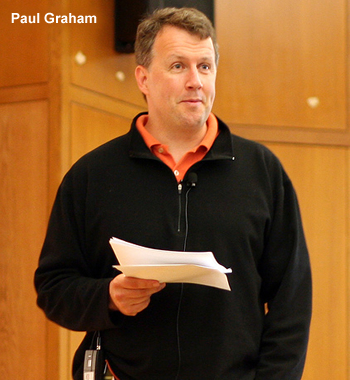Y Combinator Is A Stupid Idea
There... that should guarantee about 10,000 hits on this entry. I originally wanted to call it "Y Combinator Is A Bullshit Idea"
(which would have guaranteed about 20,000 hits) but the ads on the side
wouldn't have displayed due to the "bullshit" in the title.
So, I just read the Christopher Steiner article "The Disruptor In The Valley" at Forbes.com (which is about Paul Graham and his company Y Combinator) and my immediate thought was of that exchange from "The Simpsons" (Season 12 - Episode 9) when Homer is undergoing medical experiments for money. He tries an appetite suppressant:
 HOMER: "I'm BLIND!"
HOMER: "I'm BLIND!"
SCIENTIST #1: "Who's gonna buy a pill that makes you blind?"
SCIENTIST #2: "We'll let marketing worry about that!"
Y Combinator is basically offering Silicon Valley a pill that makes them blind (but marketing will fix it).
They offer a little bit cash to grab a whole lot of equity in all these tiny start-ups - most which are not even close to being ready for that kind of exposure (or financial decision).
However, with the right spin, PR and influence behind them, they (apparently) ARE ready for the additional money that others might throw their way (for another giant chunk of equity)... if they can manage to get through the summer YC bootcamp.
It's like the YouTube star who gets a shot on "The Big Bang Theory" and can barely speak because they're so nervous and then find out they have no acting skills whatsoever.
This is not to say that there aren't a whole lot of geniuses out there with a lot of great ideas. There are. Most are smarter than me (but not as smart as Khan Manka, Jr.).
But these geniuses (and mostly non-geniuses, let's be serious) are being exploited by Paul Graham and company and tossed to these VC wolves who will eat through many a carcass to get to the next Facebook (which I think is Worthless, by the way).
(Also Digg is dead - R.I.P. - so is Electus and Comic-Con but I digress....)
But much like the screenwriter in Los Angeles who will pay people to read their script because they "work at a studio", the chances of success in one of these cattle call models is virtually zero.
 As a quick primer, allow me a paragraph (from Wikipedia) to explain Y Combinator to those who may not know what it is:
As a quick primer, allow me a paragraph (from Wikipedia) to explain Y Combinator to those who may not know what it is:
 In other words, throw a bunch of shit on the wall and see what sticks.
In other words, throw a bunch of shit on the wall and see what sticks.
Great for Paul Graham and company, I suppose (based on his theory, Y Combinator would have gotten $20,000 from Y Combinator), but terrible for almost all of those thousands who apply to his program every year just in the hope of getting the YC stamp of approval (and 60 lbs of chili) - which supposedly means a lot to VCs and Angel Investors in Silicon Valley.
So Y Combinator is a Venture Capitalist that funds your start-up so that your start-up can get funded by another Venture Capitalist.
Enough with these f-ing VCs, man.
Whatever happened to creating a company, becoming successful and growing it based on that initial success. Success because you have a product that people really (REALLY) want.
Thousands of techies are just sitting around coffee shops and cafes in all the "Silicon Valleys of the world" trying to think up new ideas that Paul Graham (and others like him) might like. Not because it's an idea that the start-up founder actually believes in anymore - but because it's one that might get funding.
I mean, fuck passion, right? These days it's not whether your company succeeds or fails, it's whether it gets funded in the first place and a mention on TechCrunch.
 Jill Kennedy - OnMedea
Jill Kennedy - OnMedea
So, I just read the Christopher Steiner article "The Disruptor In The Valley" at Forbes.com (which is about Paul Graham and his company Y Combinator) and my immediate thought was of that exchange from "The Simpsons" (Season 12 - Episode 9) when Homer is undergoing medical experiments for money. He tries an appetite suppressant:
 HOMER: "I'm BLIND!"
HOMER: "I'm BLIND!"SCIENTIST #1: "Who's gonna buy a pill that makes you blind?"
SCIENTIST #2: "We'll let marketing worry about that!"
Y Combinator is basically offering Silicon Valley a pill that makes them blind (but marketing will fix it).
They offer a little bit cash to grab a whole lot of equity in all these tiny start-ups - most which are not even close to being ready for that kind of exposure (or financial decision).
However, with the right spin, PR and influence behind them, they (apparently) ARE ready for the additional money that others might throw their way (for another giant chunk of equity)... if they can manage to get through the summer YC bootcamp.
It's like the YouTube star who gets a shot on "The Big Bang Theory" and can barely speak because they're so nervous and then find out they have no acting skills whatsoever.
This is not to say that there aren't a whole lot of geniuses out there with a lot of great ideas. There are. Most are smarter than me (but not as smart as Khan Manka, Jr.).
But these geniuses (and mostly non-geniuses, let's be serious) are being exploited by Paul Graham and company and tossed to these VC wolves who will eat through many a carcass to get to the next Facebook (which I think is Worthless, by the way).
(Also Digg is dead - R.I.P. - so is Electus and Comic-Con but I digress....)
But much like the screenwriter in Los Angeles who will pay people to read their script because they "work at a studio", the chances of success in one of these cattle call models is virtually zero.
 As a quick primer, allow me a paragraph (from Wikipedia) to explain Y Combinator to those who may not know what it is:
As a quick primer, allow me a paragraph (from Wikipedia) to explain Y Combinator to those who may not know what it is:Y Combinator is an American seed-stage startup funding firm, started in 2005 by Paul Graham, Robert Morris, Trevor Blackwell, and Jessica Livingston. Y Combinator provides seed money, advice, and connections at 3-month programs. In exchange, they take an average of about 6% of the company's equity.
Compared to other startup funds, Y Combinator provides very little money ($17,000 for startups with two founders and $20,000 for those of three or more). This reflects Graham's theory that between free software, dynamic languages, the web, and Moore's Law, the cost of founding a startup has greatly decreased.
 In other words, throw a bunch of shit on the wall and see what sticks.
In other words, throw a bunch of shit on the wall and see what sticks. Great for Paul Graham and company, I suppose (based on his theory, Y Combinator would have gotten $20,000 from Y Combinator), but terrible for almost all of those thousands who apply to his program every year just in the hope of getting the YC stamp of approval (and 60 lbs of chili) - which supposedly means a lot to VCs and Angel Investors in Silicon Valley.
So Y Combinator is a Venture Capitalist that funds your start-up so that your start-up can get funded by another Venture Capitalist.
Enough with these f-ing VCs, man.
Whatever happened to creating a company, becoming successful and growing it based on that initial success. Success because you have a product that people really (REALLY) want.
Thousands of techies are just sitting around coffee shops and cafes in all the "Silicon Valleys of the world" trying to think up new ideas that Paul Graham (and others like him) might like. Not because it's an idea that the start-up founder actually believes in anymore - but because it's one that might get funding.
I mean, fuck passion, right? These days it's not whether your company succeeds or fails, it's whether it gets funded in the first place and a mention on TechCrunch.
 Jill Kennedy - OnMedea
Jill Kennedy - OnMedea 0 TrackBacks
Listed below are links to blogs that reference this entry: Y Combinator Is A Stupid Idea.
TrackBack URL for this entry: http://mankabros.com/cgi-sys/cgiwrap/jpgordo/managed-mt/mt-tb.cgi/589






So, this site is sort of like The Onion for the entertainment industry except really poorly written and devoid of humor?
Poorly written like a fox.
So for $17K they get 6% equity in these new companies. If they open the right doors, I suppose that is worth the money. If you keep the 6% and don't sell out and your company is worth nothing without them, 6% of 0% is zero.
I think the point of this article is more about how the do-it-yourself, authentic "entrepreneur" philosophy is no longer strong among tech startups. In the modern tech startup world, it's now all about dependence on VCs and TechCrunch and Y Combinator. It's not the "done thing" to make a company from scratch anymore.
Maybe the idea of making a company from scratch is just a dream. Networking is always involved - now it's just formalised.
Hmm.
Thank you for the auspicious writeup. It in fact was a amusement account it. Look advanced to far added agreeable from you! By the way, how can we communicate?